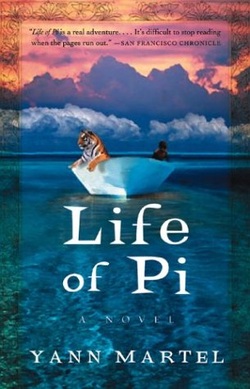By Yann Martel
★★★★★
Five Things I Liked About Life of Pi:
1. Sense of wonder toward universe, in spite of crushing aloneness
2. Richard Parker
3. Truth vs. faith; Truth vs. “the better story”
4. Resiliency of the human body/spirit
5. The writing!
Life of Pi topped the bestseller lists several years ago now. For a long time, I ignored it. I’d heard what the premise was, and it sounded both not my thing and altogether lacking in plot. Last year, though, at one of the sprawling book sale wonderlands I plundered, I wound up buying a copy anyway. At $1, it seemed like a low-risk investment. If I didn’t like it (or never even read it!), well, one dollar wouldn’t exactly empty my pockets. It took me a while to get around to actually reading it, but turns out, that was $1 very well spent.
The premise itself is absurd: a teenage boy, shipwrecked at sea en route from India to Canada, is stranded in the middle of the Pacific sharing his lifeboat with a 450-lb Bengal tiger. Suspend your disbelief long enough to pick up the book and give the first few pages a chance, and I’ll wager you’ll soon get on board (pun intended) with Pi Patel and his unbelievable tale. Pi’s family, who owned a zoo back in India and were transporting several animals - including the great Bengal tiger, Richard Parker - with them on their emigration to Canada, perished in the shipwreck. A zebra, orangutan, and hyena that initially found salvation from the greedy clutches of the sea in the lifeboat with Pi and Richard Parker also perished, at the hands (or rather jaws) of Richard Parker. Much the rest of the novel is devoted to Pi’s survival at sea, the practicalities of his efforts to tame Richard Parker and keep himself and the tiger fed, quenched, and relatively protected from the elements, as well as the more intangible yet equally or even more pressing experiences of unremitting loneliness and loss, and the incredible, improbable wonder that swells in a human heart communing without distraction with the vast and unmitigated power of nature in motion.
The resolution of Life of Pi is beautifully orchestrated, casting into doubt first the veracity of Pi’s narrative and then prodding you to question to what extent it matters. How much do the stories we tell about our experiences reflect truth and to what extent are they woven with fabrication? How much do we script these stories to include the divinity or wonder that cushions us from the harsh realities of the world? How salient are divinity and wonder in our everyday lives? Is it necessary to suffer in order to remember to recognize and appreciate simple glimpses of universality - in the endless expanse of a starry sky, in the cyclical calm and turmoil of the open sea, in the respectful gaze of a potential predator - that are present in even the most hopeless of moments? These are the kind of questions Life of Pi raises, questions that stop you short and make you attempt to bring ideas too big for one moment into focus in your mind. Working to wrangle those ideas into the forefront of your mind, bit by bit until each piece is clear enough to begin incorporating into the unmanageable whole, is a privileged and ennobling experience.
Conversation Starter: Have you ever experienced a moment in nature, or just life in general, when you were overcome with an absolute, almost tangible awareness of the inherent divine dignity present in the world around you?
Books Read This Year: 91
Top 100 Progress: 48/100


No comments:
Post a Comment